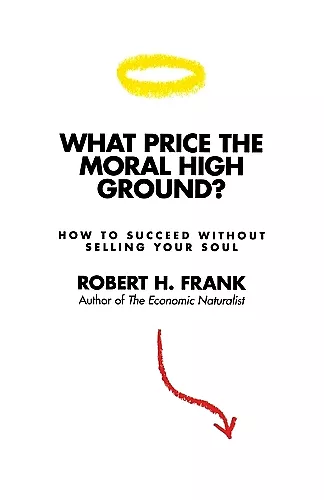What Price the Moral High Ground?
How to Succeed without Selling Your Soul
Format:Paperback
Publisher:Princeton University Press
Published:16th Apr '10
Should be back in stock very soon

This book challenges the idea that self-interest is the sole driver of success, exploring how cooperation and ethical behavior can lead to better outcomes.
In What Price the Moral High Ground?, economist Robert Frank delves into the complexities of human behavior in economic contexts, challenging the widely accepted notion that self-interest is the primary motivator behind all actions. He explores the dynamics of financial disasters and the actions of greedy bankers, suggesting that these events may reinforce the idea that personal gain often overshadows the greater good. However, Frank argues that this perspective is too simplistic and fails to account for the ways in which cooperation and ethical behavior can lead to success.
Through a blend of research from economics, psychology, and biology, What Price the Moral High Ground? presents a compelling case for the success of honest individuals in competitive environments. Frank illustrates how these individuals often become preferred trading partners due to their commitment to principles and integrity. He discusses various scenarios, such as the preference for modestly paid public sector jobs over higher-paying private sector roles, and how social norms can effectively deter opportunistic behavior.
Frank's insights have significant implications for both private and public sector leaders, offering a fresh perspective on how organizations and policies can be structured to promote cooperation and ethical behavior. By moving beyond the traditional self-interested economic model, What Price the Moral High Ground? provides a nuanced understanding of the motivations behind human actions and the potential for success through moral integrity.
"This book is short, accessible and thought-provoking... Frank draws heavily from game theory and evolutionary biology to explain why do-gooders work for less and firms that don't squeeze suppliers and cheat customers profit over the long run."--Washington Post "Moral behavior is not irrational ... Frank insists. The challenge is to define self-interest in a manner capacious enough to accommodate the real motives for people's choices. Frank does this with a mixture of Darwinian science, psychology, and flexible common sense."--Laura Secor, Boston Globe "What Price the Moral High Ground? Is wide-ranging and well-written."--John J. DiIulio, Jr., The Weekly Standard "[Frank's] vision is one that allows people to strive to meet their chosen goals and promotes the common good in an ordered cosmos--which is exactly where many of us want to live."--Merrill Matthews, Business Economics
ISBN: 9780691146942
Dimensions: unknown
Weight: 227g
224 pages